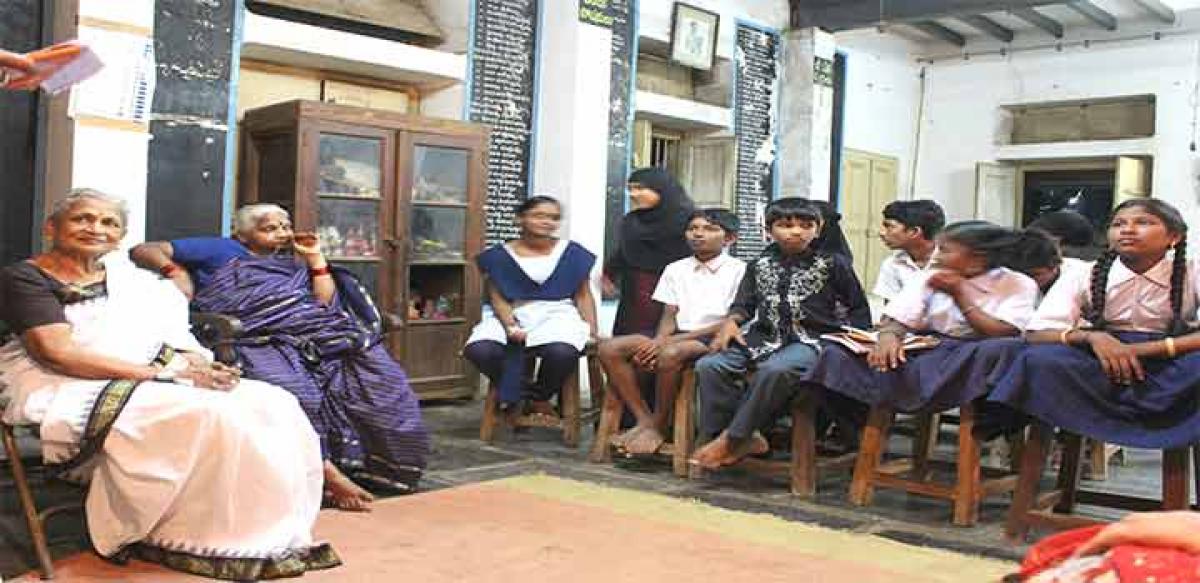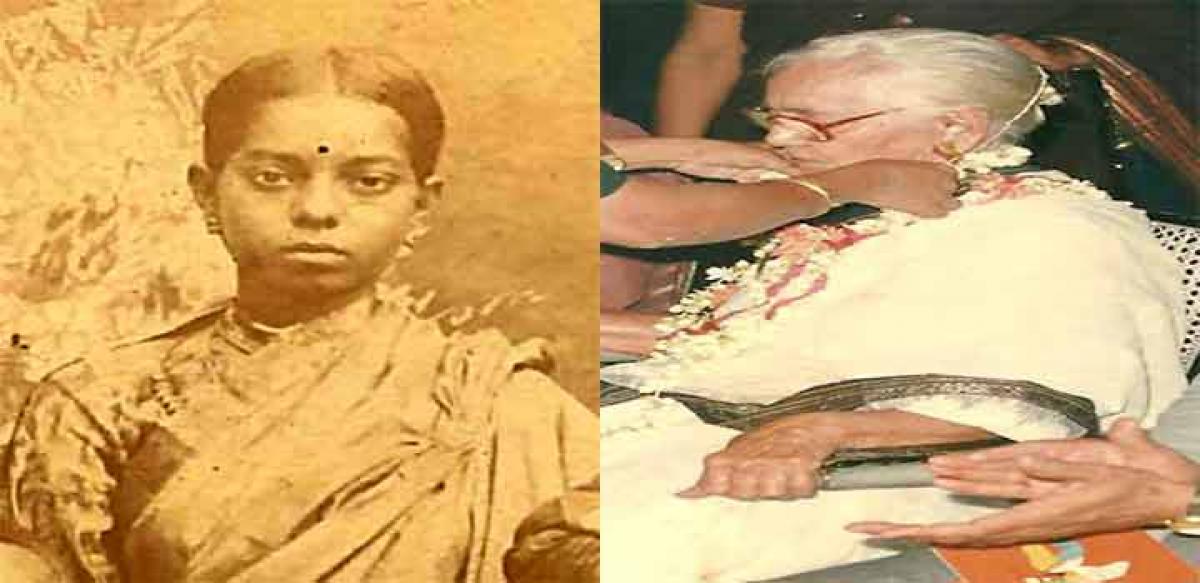Live
- BJP MP candidate Bharat Prasad visited the student who tried to commit suicide
- PM’s popularity in the fast lane: Autos with 'Har Dil Mein Modi' slogan spotted across Delhi
- Delhi-based political parties are like East India Company: Sukhbir Badal
- Golf: Diksha moves into Top-20 at South African Women’s Open
- KCR lashes out against BJP and Congress for destroying Telangana
- Dairy Science students visited the Milk cooling plant
- Moody feels Pant ahead in keepers’ race for T20 WC squad; Srikkanth picks Rahul over Samson as reserve keeper
- Thanking voters for extending 'unparalleled support' to NDA, PM Modi says second phase 'too good'
- Natural Relief for Menstrual Cramps: Beetroot Juice Recipe
- Asha Worker died in a road accident
Just In

Kollayi gattithe nemi maa Gandhi... The high-pitched voices of bright-eyed, bushy-tailed children reverberate around the room as Mahatma Gandhi is once again remembered on his birth anniversary last Friday. It is a room that heard the praise of the Mahatma thousands of times before, for 75 years now. It is the building that houses the Mahila Seva Mandali in Machilipatnam, Krishna district of Andhra Pradesh.
.jpg)
Kollayi gattithe nemi maa Gandhi... The high-pitched voices of bright-eyed, bushy-tailed children reverberate around the room as Mahatma Gandhi is once again remembered on his birth anniversary last Friday. It is a room that heard the praise of the Mahatma thousands of times before, for 75 years now. It is the building that houses the Mahila Seva Mandali in Machilipatnam, Krishna district of Andhra Pradesh.
Machilipatnam has always been a fountainhead of cultural and social movements. However, for the women of the historical town in the 1930s, primary focus was on recreation, rather than any association with the public life as it happened in the pre-Independence India.
There was one woman, however, who was utterly dissatisfied with the way the Ladies’ Recreation Club of Machilipatnam worked. Dulla Venkata Ramanamma. Working as Secretary of the Club, Ramanamma was well-known for her efficiency and verve but she herself was discontent with the social distinctions that the Club practised.
Ramanamma found the sycophancy towards the wives of Collectors and Judges, the bigotry against women of lower classes and castes who came to the Club very distasteful and this led to her to float her own organisation. The process of the emergence of Mahila Seva Mandali is as interesting as the agenda behind it.

Ramanamma wanted an organisation that would provide a platform for women to blend in with the political movements and mood of those times. A forum where women of all classes and ages could come forward, mingle and share and express. And, most importantly, participate in the freedom movement that had the nation in a seething turmoil.
And that is how Mahila Seva Mandali was founded in 1939, with emphasis on the word Seva, with an express objective of serving women’s interests and working with a cultural and political orientation.The membership drive of the Mandali itself was novel and keeping in sync with the national sentiment.
The annual membership of Rs 3 could be paid at one time, or in EMIs of 25 paisa per month. Or, in three loops of khadi thread, taken off the spindles, known as chilapalu. One of the primary activities of the Mandali was to have Charkha sessions. And those who volunteered for the Mandali, usually young girls, did not have to pay any membership fee at all.
Ramanamma, younger sister of legendary writer Chalam, was a woman of substance and innovation. She came up with ideas for a programme every month, mobilising women from every stratum of society and invited the who’s who of the town to those programmes. Invites were sent out, young girls and women trained to perform.
The themes of the plays were either the latest move of the Indian National Congress in the freedom movement or an episode taken out of Mahatma Gandhi’s life or his teachings. Mandali took out Prabhat Bheris (Pheres) from 4 am to 6 am, across the town, with more than 50 people singing patriotic songs,
exhorting people to join the freedom struggle and shouting inspirational slogans. The gathering culminated at Ramanamma’s home where delicious hot coffee and breakfast awaited everyone. In 1941-42, the Mandali team enacted classics such as ‘The Merchant of Venice’ and ‘Kanya Shulkam’ and mobilised funds.
Every week, a Charkha session was organised and the thread collected from those sessions and as membership was sent off to Andhra Jateeya Kalashala (National College), where artisans from backward communities sat and wove Khadi cloth. And the cloth was sold back to the members and funds raised for the Mandali. Most of the members of the Mandali, including Ramanamma’s own family,wore only Khadi their entire lives.
In 1951, Mahila Seva Mandali was granted cooperative stores and was given milk powder, ghee and wheat rava that was used to provide nutritious evening meal to children across the town. In early 1950s, when a minister from the then Madras state government visited Mandali and announced a grant of Rs 5,000, Mandali could put together its own collections from the tickets sold for various shows and get their own building by 1957.
Rajeswari, wife of the founder of Andhra Bank, Bhogaraju Pattabhi Seetaramayya, was then president of Mandali. Later on, a Bala Vihar was established on her name, buying a piece of land with the Rs 600 donation given by Pattabhi Seetaramayya. By 1960s, Mahila Seva Mandali was recognised as a reputed social organisation and it’s silver jubilee celebrations were attended by Kasu Brahmananda Reddy, the then Chief Minister, and his wife Raghavamma.
Donors included NTR, ANR and Savitri and the Mandali was visited by innumerable dignitaries. Maestro Vempati China Satyam, then teaching Bharata Natyam, also ran dance classes at the Mandali for two years in the 1950s. Dr Lata Devi Dulla, the daughter-in-law of Dulla Ramanamma, and the daughter of a Maharashtrian Sarvodaya family, is now the secretary of Mandali.
For the last 50 years, Dr Lata Devi has been organising free medical camps in Krishna district and has been instrumental in garnering a grant for Mandali from Help Age India to set up a home for the aged. Karuna Nilayam ran for 22 years. Dulla Ramanamma was a dynamic persona.
She spared no effort in mobilising women, going from door to door and bringing them out into the movement and cultural activities. She refused mere donations and insisted that women should get educated and participate in public life.
And, her brainchild, Mahila Seva Mandali of Machilipatnam, stands as a shining example of strength of character and culture in an India that was struggling to free itself and find its own identity.
By:Usha Turaga-Revelli

© 2024 Hyderabad Media House Limited/The Hans India. All rights reserved. Powered by hocalwire.com







